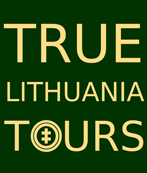Socio-economic groups of Lithuania
In the Lithuanian society, class divisions are low-key. Members of very different affluence levels more usually than not live in the same neighborhoods, buy at the same shopping malls and send their children to the same public (rather than private) schools. Complex history, where classes were frequently shuffled by various occupational forces, played a part in this.
Ignas Staškevičius (left), one of the richest people in Lithuania, working as a salesman for his publishing house during Vilnius Book Fair. Even the largest Lithuanian businesses tend to be (micro)managed by their owners. ©Augustinas Žemaitis.
The influential elite of Lithuania consists of several very different groups. The first group is that of the so-called "Soviet nomenclature". To the dismay of 1990s independence activists, many of these remained in powerful positions, continuing their old practice of conformism with whoever is in power and reciprocal cronyism. With the collapse of the Soviet Union, many of them have switched their ideals to pro-European Union (as this is where the new winds are blowing). Slow lustration meant that unlike in some other ex-communist countries the people of Lithuania were not informed on who served totalitarian institutions during the Soviet occupation. The former "nomenclature" is typically reluctant to show off its wealth as this would attract unwanted attention and questions.
After independence, the Soviet "nomenclature" was joined in the competition for political power by the former independence activists (mainly libertarian or conservative intellectuals).
A former independence activist shows the underground printing press her family used to circumvent Soviet censorship. Many families have such stories of resistance, suffering or quiet defiance to tell. Those who collaborated however usually keep silent. The division is noticeable and even the young are sometimes evaluated by their parents' occupation-era deeds. ©Augustinas Žemaitis.
In vying for economic power, the "nomenclature" was in some sectors outcompeted by 1990s self-made men who established retail, import/export and other businesses in the late 1980s and early 1990s, as well as privatized those Soviet "businesses" that the "nomenclature" didn't want. As the new opportunities were most eagerly grabbed by people in their 20s and 30s the Lithuanian millionaire community of the era was younger than in many other countries. In the early 1990s people were eager to put their newly acquired wealth into large suburban homes and expensive cars, but with time this trend diminished, although a constant and stable group of Lithuania's rich "elite" publicizes their endeavours in socialite magazines.
Despite the relatively similar class lifestyles, there is some resentment against businessmen, rooted both in the Soviet propaganda ("trade=theft") and the significance of "turncoat Soviet nomenclature" among the rich. The recent 2000s high-tech entrepreneurs are respected more.
With high streets and malls dominated by chain stores, the small businessmen largely stick to marketplaces and fairs, although online retail/services gain popularity among younger starters.
The relative lack of labour-intensive industries means that there are few industrial workers in Lithuania. Labor unions are generally weaker than in western Europe and they suffer a certain image problem as a part of society associates them with the former Soviet regime (when the state was both the only true employer and the real power behind the puppet labor unions). Businessman, on the other hand, are sceptical of the labor unions because of the situations when their leaders mobilize the unions for their own personal gain rather than that of the workers.
Traditional intellectuals may be considered another class that consists of teachers, doctors, scientists, and classical artists. Loyal intellectuals were supported by the Soviet regime, moreover, their jobs used to be the most prestigious ones as they offered access to various other people. This access was more important than money in the Soviet society where many goods could have been obtained only through personal relations with someone responsible for distribution. After independence, the education and healthcare remained public rather than private (leading to mediocre salaries) while classical art failed to attract enough customers to be commercially viable. Therefore some intellectuals, while deeply critical of the Soviet totalitarianism, believe that the current system is treating them unfairly. However, it may be so that a significant part of this group has failed to adapt, with (for example) universities still choosing which research projects to undertake based on personal relations with the scientists, which impedes the will of private companies to fund these projects.
Another significant force in the society is the peasantry. Some 12% of the workforce is in agriculture, but this is diminishing as agriculture turns into another form of business, partly funded by the European Union money and impossible without sacrificing the workforce numbers for technology and economies of scale. Emotional peasant protests against government policies and roadblocks by farming equipment of the 1990s are therefore a thing of the past, replaced by other forms of lobbying.
Historical classes, such as the nobility, are completely meaningless, as they were stripped of their final benefits some 100 years ago. Subsequently, the Soviets completely destroyed their culture and remaining landholdings.
A certain underclass, so-called asocial people, lives on benefits and criminal activity. Many of them are dependent on alcohol, some on drugs. Among the criminals, there is their own division into castes, largely inherited from the Russian and Soviet prison system.
While the post-independence generations (born ~1990 and later) that are now entering the elite lack the Soviet experiences that forged the divisions in the Lithuanian society, they often still align themselves with those older groups, often depending on their upbringing, ethnicity, the circle of friends and more. Still, another part of the post-independence population associates themselves with social groups common in the West instead (this is more common among those who studied or lived in the West).
Moreover, the internet and favorable tax initiatives also allowed foreign multinationals (banks, IT companies) to establish their back-offices in Lithuania in the 2010s or at least to outsource some of their work. This gave birth to a new social "class" in Lithuania: the employees and contractors of foreign multinationals, who typically earn salaries that are three-to-ten times larger than a Lithuanian average. They enjoy Western living standards and massive conspicuous consumption, something that was previously possible only for the owners of medium and large businesses. They make the bulk of customers for places such as recently-bludgeoned uber-expensive restaurants and prestige-car dealerships. However, these people live nearly exclusively in the largest cities (and their suburbs), as there are no foreign investments or interests elsewhere. Most of them are in tehir 20s-30s, as lack of knowledge of English precludes the earlier generations from reaping the benefits of foreign multinationals.
Share this:
Click [+] for more
- [+]Advice (52)
- [+]Accomodation and Food (3)
- [+]Climate (1)
- [+]Entertainment (5)
- [+]Services (7)
- [+]Shopping (5)
- [+]Transportation (get in & around) (11)
- [+]Warnings, dangers and red tape (4)
- [+]Accomodation and Food (3)
- [+]Cities (116)
- [+]Kaunas (36)
- [+]Kaunas by borough (district) (11)
- [+]Kaunas by topic (8)
- [+]Kaunas by borough (district) (11)
- [+]Klaipėda (26)
- [+]Klaipėda by Borough (District) (6)
- [+]Klaipėda by Topic (7)
- [+]Klaipėda by Borough (District) (6)
- [+]Panevėžys (1)
- [+]Šiauliai (6)
- [+]Vilnius (41)
- [+]Vilnius by borough (district) (10)
- [+]Vilnius by topic (11)
- [+]Vilnius by borough (district) (10)
- [+]Kaunas (36)
- [+]Culture (66)
- [+]Architecture (10)
- [+]Diaspora (7)
- [+]Ethnicities (11)
- [+]Holidays / Celebrations (12)
- [+]Languages (3)
- [+]Religions (16)
- [+]Architecture (10)
- [+]History&Today (86)
- [+]Economy (3)
- [+]Ethnic relations (8)
- [+]Famous Lithuanians (9)
- [+]FAQ (15)
- [+]History (8)
- [+]Maps (7)
- [+]Politics and Law (10)
- [+]Society (11)
- [+]State symbols (3)
- [+]Economy (3)
- [+]Lifestyle (25)
- [+]Art and literature (5)
- [+]Cuisine (1)
- [+]Music (3)
- [+]Sports (6)
- [+]Theatre and Cinema (3)
- [+]Art and literature (5)
- [+]News (54)
- [+]Offers (34)
- [+]Jewish offers (6)
- [+]Jewish tours (3)
- [+]Jewish tours (3)
- [+]Kaunas offers (10)
- [+]Kaunas tours (5)
- [+]Kaunas tours (5)
- [+]Lithuania offers (1)
- [+]Tours (9)
- [+]Vilnius offers (6)
- [+]Vilnius tours (3)
- [+]Vilnius tours (3)
- [+]Jewish offers (6)
- [+]Regions (50)
- [+]Aukštaitija (Northeast) (12)
- [+]Dzūkija (Southeast) (5)
- [+]Lithuania Minor (Southwest) (7)
- [+]Samogitia (Northwest) (11)
- [+]Sudovia (South) (2)
- [+]The environs of Lithuania (7)
- [+]Aukštaitija (Northeast) (12)
- [+]Sights (129)
- [+]Beautiful nature (9)
- [+]Castles and fortresses (8)
- [+]Museums (9)
- [+]Religious sites (7)
- [+]Resorts (7)
- [+]Top 10 lists (63)
- [+]Culture itineraries (3)
- [+]Ethnic itineraries (6)
- [+]Historical itineraries (7)
- [+]Hobby itineraries (12)
- [+]Itineraries by transport form (5)
- [+]Lithuania-related concepts (4)
- [+]Religion itineraries (5)
- [+]Special needs itineraries (4)
- [+]Weekend breaks (5)
- [+]Culture itineraries (3)
- [+]Towns (17)
- [+]Beautiful nature (9)
Sister websites
- Destination Lithuanian America Lithuanian-American heritage sites map
- Global True Lithuania Lithuanian communities and heritage all over the world
- On Latvia All about Latvia
- True Lithuania Youtube English videos on Lithuania and interviews with Lithuanians abroad
Recent Comments
- John on Did Lithuania support the Nazi Germany during WW2?
- Ricky mak on First wave of Lithuanian emigration (1865-1915)
- Augustinas Žemaitis on First wave of Lithuanian emigration (1865-1915)
- Augustinas Žemaitis on First wave of Lithuanian emigration (1865-1915)
- Diane Davis on Lithuanian mythology and folklore
Advertisement
Donations
Youtube



July 10th, 2020 - 13:09
Very informative article. It helped clear up some of my misunderstandings. Thank you!
January 8th, 2021 - 23:21
Thanks for sharing your thoughts about class divisions in lithuania.
Regards